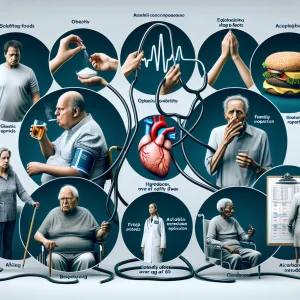Understanding High Blood Pressure: The Silent Threat to Your Health
High blood pressure, also known as hypertension, is a widespread health concern that affects millions of adults around the globe. Often, individuals remain unaware of their condition, as the symptoms of high blood pressure can be subtle and easily overlooked. This lack of awareness is particularly troubling because if left untreated, hypertension can lead to severe health complications, including heart disease and stroke. Regular blood pressure screenings are essential to detect and manage this condition early, ensuring your cardiovascular health remains intact.
Implementing small yet impactful lifestyle changes can significantly enhance your ability to manage blood pressure effectively. Simple adjustments, such as incorporating a balanced diet that includes a variety of fruits, vegetables, and whole grains, coupled with prioritizing restful sleep, can positively influence your overall health and help maintain blood pressure within a safe range. These proactive lifestyle modifications not only foster better cardiovascular health but also contribute to an improved quality of life.
 The Importance of Blood Pressure: What You Need to Know About Measurement
The Importance of Blood Pressure: What You Need to Know About Measurement
Blood pressure refers to the force exerted by circulating blood against the walls of your blood vessels, primarily influenced by the heart's pumping mechanism. This measurement is crucial as it indicates how efficiently blood is flowing throughout your body and the resistance it encounters in the arteries. Maintaining an optimal blood pressure level is vital for overall health, as any increase can pose serious risks to your well-being, including increased chances of heart attack and stroke.
Blood pressure is measured in millimeters of mercury (mmHg) and is represented by two critical figures:
- Systolic Pressure – The first and higher number indicates the pressure in your arteries when your heart beats and pumps blood.
- Diastolic Pressure – The second and lower number reflects the pressure in your arteries while your heart is resting between beats.
For example, a blood pressure reading of 120/80 mmHg signifies a systolic pressure of 120 and a diastolic pressure of 80, which is generally viewed as a normal and healthy level.
Uncovering the Causes and Risks Associated with High Blood Pressure
High blood pressure can stem from various factors, frequently linked to narrowed arteries that increase resistance to blood flow. This heightened resistance can raise blood pressure levels, exerting considerable strain on essential organs such as the kidneys, heart, brain, and eyes. If left unchecked, chronic hypertension can lead to severe health issues, particularly various cardiovascular diseases that can significantly impair quality of life.
Blood pressure can vary for multiple reasons, and healthcare experts categorize measurements based on established criteria:
Low blood pressure – 90/60 mmHg or lower
Normal blood pressure – Ranges from 90/60 mmHg to 120/80 mmHg
High blood pressure – 140/90 mmHg or above
A reading between 120/80 mmHg and 140/90 mmHg indicates a potential risk of developing hypertension in the future. However, it's essential to recognize that individual blood pressure norms may vary, making it crucial to consult with your healthcare provider to understand your specific thresholds.
 Exploring the Key Factors Leading to High Blood Pressure
Exploring the Key Factors Leading to High Blood Pressure
High blood pressure does not have a singular cause; instead, it is influenced by a variety of risk factors that can contribute to its onset. Some significant contributors include:
- Being overweight or obese
- Smoking
- High sodium intake
- Family history of hypertension
- Excessive alcohol consumption
- Chronic sleep deprivation
- Insufficient physical activity
- Aging, particularly those over 65
- Ethnicity, especially among Caribbean or African descent
Many of these risk factors can be modified through changes in lifestyle and behavior. In rare cases, high blood pressure may result from underlying medical conditions or medications, affecting about 1 in 20 individuals. These conditions may include:
- Thyroid dysfunction
- Kidney disease
- Diabetes
- Use of corticosteroids
- Hormonal contraceptives
- Recreational drug use, such as cocaine
Understanding the Subtle Indicators of High Blood Pressure
One of the most significant challenges with hypertension is that it often develops without noticeable symptoms, causing many individuals to remain unaware of their condition. In the UK, approximately 25% of adults are estimated to be living with undiagnosed high blood pressure. The only reliable method for determining your blood pressure status is through regular testing.
Your blood pressure can be measured at various locations, including:
- Your GP’s office or with any healthcare professional—just ask for a blood pressure check.
- Many local pharmacies offer blood pressure monitoring services.
- Some workplaces conduct health screenings that include blood pressure checks.
- At home, using a personal blood pressure monitor for convenience.
 Proven Strategies to Effectively Reduce Your Blood Pressure
Proven Strategies to Effectively Reduce Your Blood Pressure
Considering the significant role lifestyle factors play in contributing to high blood pressure, implementing strategic changes can greatly reduce your risk. Here are four essential strategies you can adopt:
Incorporate Regular Physical Activity into Your Routine
Engaging in regular exercise is vital for maintaining the health of your heart and blood vessels, ultimately aiding in the reduction of blood pressure levels. Excess weight puts unnecessary strain on your heart, making it work harder to circulate blood effectively. By committing to a consistent exercise regimen, you can shed excess weight and enhance your cardiovascular fitness, both of which are instrumental in lowering blood pressure and improving overall health.
Embrace a Heart-Healthy Nutritional Plan
Focusing on a well-rounded diet that prioritizes whole foods, including a variety of fruits, vegetables, and lean sources of protein, can significantly aid in lowering blood pressure. Since high sodium intake is known to elevate blood pressure, it is essential to limit salt consumption. The NHS recommends keeping salt intake below 6g per day, approximately one teaspoon. Opting for fresh ingredients over processed foods rich in sodium and using herbs and spices for flavor can help you maintain a heart-healthy diet.
Moderate Your Alcohol Intake
Reducing both the amount and frequency of alcohol consumption can have a substantial impact on managing blood pressure levels. Incorporating alcohol-free days into your week and spacing out drinking occasions can be particularly beneficial. Although the NHS recommends a maximum of 14 units of alcohol weekly—equivalent to 7 pints of 4% ABV beer or 7 glasses of 175ml wine—it is not necessary to consistently reach this limit for health benefits.
Ensure Adequate, Restorative Sleep
Chronic sleep deprivation can increase the likelihood of developing high blood pressure. The NHS suggests aiming for 6 to 9 hours of quality sleep per night to support overall health and maintain healthy blood pressure levels. Establishing a calming bedtime routine and creating an optimal sleep environment can significantly enhance your sleep quality, thereby playing a crucial role in blood pressure management.
Presented By: Private Blood Pressure Tests
The Article Blood Pressure Test Explained: What You Need to Know Was Found On https://limitsofstrategy.com
Comments are closed